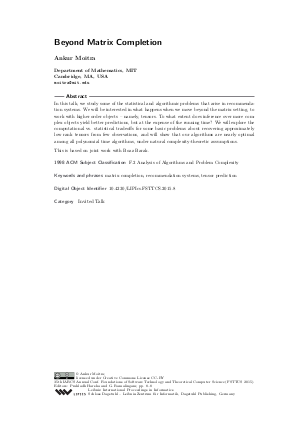Beyond Matrix Completion (Invited Talk)
Author Ankur Moitra
-
Part of:
Volume:
35th IARCS Annual Conference on Foundations of Software Technology and Theoretical Computer Science (FSTTCS 2015)
Part of: Series: Leibniz International Proceedings in Informatics (LIPIcs)
Part of: Conference: IARCS Annual Conference on Foundations of Software Technology and Theoretical Computer Science (FSTTCS) - License:
 Creative Commons Attribution 3.0 Unported license
Creative Commons Attribution 3.0 Unported license
- Publication Date: 2015-12-14
File

PDF
LIPIcs.FSTTCS.2015.8.pdf
- Filesize: 200 kB
- 1 pages
Document Identifiers
Subject Classification
Keywords
- matrix completion
- recommendation systems
- tensor prediction
Metrics
- Access Statistics
-
Total Accesses (updated on a weekly basis)
0Document
0Metadata
Abstract
Here we study some of the statistical and algorithmic problems that arise in recommendation systems. We will be interested in what happens when we move beyond the matrix setting, to work with higher order objects — namely, tensors. To what extent does inference over more complex objects yield better predictions, but at the expense of the running time? We will explore the computational vs. statistical tradeoffs for some basic problems about recovering approximately low rank tensors from few observations, and will show that our algorithms are nearly optimal among all polynomial time algorithms, under natural complexity-theoretic assumptions. This is based on joint work with Boaz Barak.
Cite As Get BibTex
Ankur Moitra. Beyond Matrix Completion (Invited Talk). In 35th IARCS Annual Conference on Foundations of Software Technology and Theoretical Computer Science (FSTTCS 2015). Leibniz International Proceedings in Informatics (LIPIcs), Volume 45, p. 8, Schloss Dagstuhl – Leibniz-Zentrum für Informatik (2015)
https://doi.org/10.4230/LIPIcs.FSTTCS.2015.8
BibTex
@InProceedings{moitra:LIPIcs.FSTTCS.2015.8,
author = {Moitra, Ankur},
title = {{Beyond Matrix Completion}},
booktitle = {35th IARCS Annual Conference on Foundations of Software Technology and Theoretical Computer Science (FSTTCS 2015)},
pages = {8--8},
series = {Leibniz International Proceedings in Informatics (LIPIcs)},
ISBN = {978-3-939897-97-2},
ISSN = {1868-8969},
year = {2015},
volume = {45},
editor = {Harsha, Prahladh and Ramalingam, G.},
publisher = {Schloss Dagstuhl -- Leibniz-Zentrum f{\"u}r Informatik},
address = {Dagstuhl, Germany},
URL = {https://drops.dagstuhl.de/entities/document/10.4230/LIPIcs.FSTTCS.2015.8},
URN = {urn:nbn:de:0030-drops-56650},
doi = {10.4230/LIPIcs.FSTTCS.2015.8},
annote = {Keywords: matrix completion, recommendation systems, tensor prediction}
}
